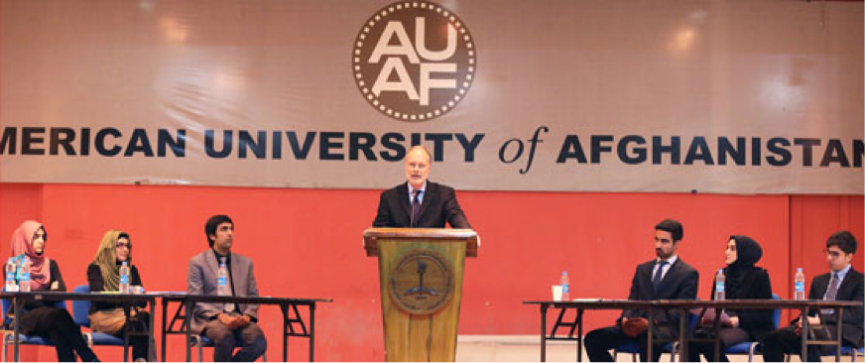
Public Diplomacy in Action: U.S.-Afghanistan Dialogue
Last month, I had the very unique and fortunate experience of video conferencing students at the American University in Afghanistan, as part of my Understanding U.S. Foreign Policy Towards Afghanistan course, offered by the University of Maryland Honors College.
Over the course of the semester, my 19 classmates and I learned about the history of Afghanistan, focusing especially on tribal groups and government leaders, as well as counter-narcotics programs and the growth in women’s rights and education after the Taliban.
I came to the video conference armed with this historical information and knowledge of current events in Afghanistan from keeping up with the news, but with really no expectations. From my experiences studying & living abroad in the Middle East and North Africa, and even hosting a foreign-exchange student in my family’s home, I certainly have had my fair share of cross-cultural experiences—but never with peers who have grown up in a war zone.
Looking at and reading about AUAF, however, one would never guess it is located in a country repeatedly ranked as one of the most dangerous for aid workers, and one to which travel is discouraged for Americans and those of other nationalities. Over 1,700 students—both male and female—are enrolled today, up from an enrollment of only 50 students in 2006. The University awards bachelor degrees in business administration, information technology & computer science, political science & public administration, and law, also offers an MBA program, and just began a master of arts degree program in education. Scholarships and financial aid are available for students, the faculty are highly educated—many from Western institutions. The University has even produced an incredible 29 Fulbright Scholars. Students spoke of the University as being a respite from normal life in Kabul.
There was no set agenda for this conversation; rather, the students on both sides performed a sort of ‘Q&A’ back and forth. Conversation about the recent Afghan elections dominated the discussion, as elections had just occurred but a clear winner had not been announced. We also discussed life for women in Afghanistan, the polarized American political system, and the Afghan economy.
All together, we had a very informative and substantive dialogue. I was repeatedly impressed by how well-versed my Afghan peers were in American politics, much more so than my classmates and I were in the nuances of the Afghan political system. It was fascinating to hear firsthand about their academic and career aspirations, and even more of their hope for their country. I thoroughly enjoyed the conversation and came away from it with a very enlightened picture of Afghanistan, and of Kabul in particular, different from what is normally painted by reading the news.
With this optimism, though, comes the reality of the Afghan security situation. The day after this video chat, three Americans were killed at a hospital in Kabul, and attacks by the Taliban have resumed after the elections.
Still, though, the lessons and perspective gained from this encounter endure. The goodwill fostered by our conversation and open dialogue in and of itself is important, but also goes helps in creating a basis for people-to-people engagements between the Afghan and American people. Furthering the hope for this type of relationship building, the University of Maryland Honors College and American University in Afghanistan recently signed an agreement encouraging exchange opportunities between the two institutions with the promise of working together in the future—so there is certainly more to come.





